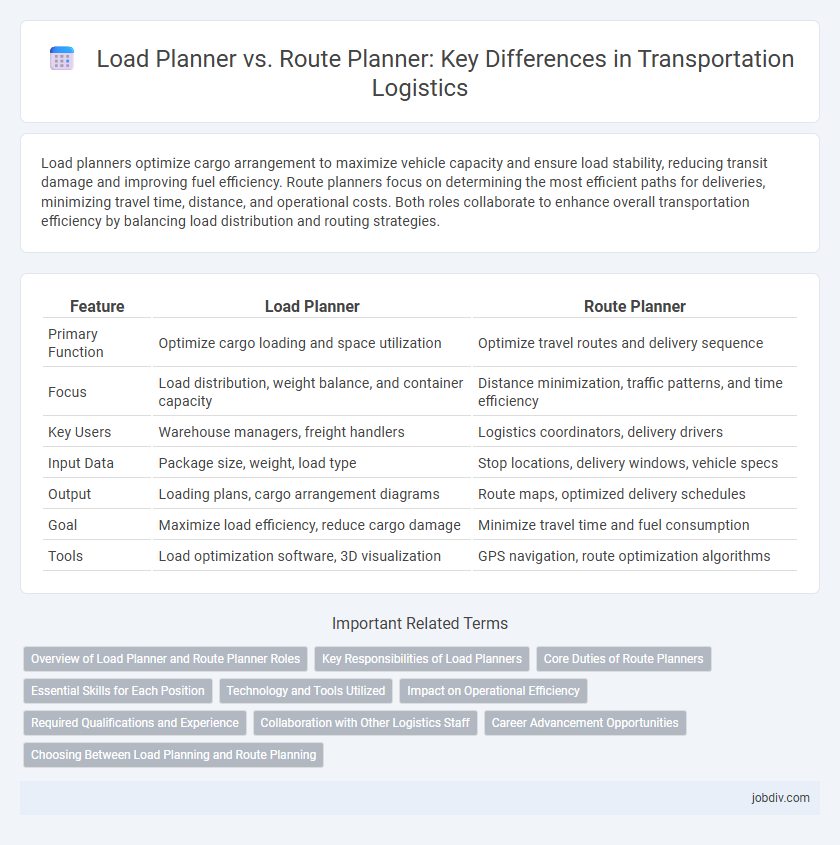Load planners optimize cargo arrangement to maximize vehicle capacity and ensure load stability, reducing transit damage and improving fuel efficiency. Route planners focus on determining the most efficient paths for deliveries, minimizing travel time, distance, and operational costs. Both roles collaborate to enhance overall transportation efficiency by balancing load distribution and routing strategies.
Table of Comparison
| Feature | Load Planner | Route Planner |
|---|---|---|
| Primary Function | Optimize cargo loading and space utilization | Optimize travel routes and delivery sequence |
| Focus | Load distribution, weight balance, and container capacity | Distance minimization, traffic patterns, and time efficiency |
| Key Users | Warehouse managers, freight handlers | Logistics coordinators, delivery drivers |
| Input Data | Package size, weight, load type | Stop locations, delivery windows, vehicle specs |
| Output | Loading plans, cargo arrangement diagrams | Route maps, optimized delivery schedules |
| Goal | Maximize load efficiency, reduce cargo damage | Minimize travel time and fuel consumption |
| Tools | Load optimization software, 3D visualization | GPS navigation, route optimization algorithms |
Overview of Load Planner and Route Planner Roles
Load planners optimize cargo distribution by maximizing vehicle space and ensuring compliance with weight limits to prevent damage and enhance efficiency. Route planners design optimal travel paths considering distance, traffic, delivery windows, and fuel consumption to minimize transit time and operational costs. Both roles are critical for seamless supply chain management and improving overall transportation productivity.
Key Responsibilities of Load Planners
Load planners optimize cargo distribution by efficiently arranging goods within transportation vehicles to maximize space utilization and ensure weight balance. They coordinate closely with warehouse teams and carriers to schedule loading sequences that align with delivery windows and safety regulations. Precise inventory management and real-time adjustments to load configurations are critical to minimizing delays and transportation costs.
Core Duties of Route Planners
Route planners specialize in optimizing delivery routes to maximize fuel efficiency, reduce transit times, and ensure timely arrivals by analyzing traffic patterns, delivery windows, and vehicle capacities. They utilize geographic information systems (GIS) and routing software to design cost-effective routes that balance workload and meet customer service requirements. Core duties include monitoring route performance, adjusting plans in real-time for disruptions, and coordinating with drivers to maintain schedule adherence.
Essential Skills for Each Position
Load planners must excel in spatial reasoning, cargo optimization, and weight distribution to maximize vehicle capacity and ensure safety compliance. Route planners require expertise in geographic information systems (GIS), traffic pattern analysis, and time management to create efficient delivery routes and minimize fuel consumption. Both roles demand strong problem-solving abilities and proficiency in transportation management software.
Technology and Tools Utilized
Load planners utilize advanced software incorporating AI algorithms and optimization models to maximize cargo capacity and ensure weight distribution compliance, enhancing efficiency in freight management. Route planners employ GPS-based mapping tools, real-time traffic data integration, and predictive analytics to determine the most efficient travel paths, reducing fuel consumption and delivery times. Both roles leverage cloud-based platforms and IoT devices for seamless data sharing and dynamic decision-making in transportation logistics.
Impact on Operational Efficiency
Load planners optimize cargo distribution by maximizing trailer space utilization and balancing weight limits, reducing fuel consumption and minimizing delays. Route planners determine the most efficient paths for deliveries based on traffic patterns, road conditions, and delivery windows, cutting travel time and operational costs. Coordinating load planning with route optimization enhances overall operational efficiency by streamlining workflow and improving resource allocation.
Required Qualifications and Experience
Load planners typically require expertise in logistics, inventory management, and freight consolidation, often necessitating a background in supply chain management or transportation. Route planners must possess strong analytical skills, proficiency in mapping software, and experience in optimizing delivery schedules, frequently supported by knowledge in geographic information systems (GIS) or route optimization technology. Both roles benefit from practical experience in transportation operations, but load planners focus more on cargo coordination while route planners prioritize efficient travel paths.
Collaboration with Other Logistics Staff
Load planners coordinate with warehouse and inventory teams to ensure optimal cargo arrangement and maximize truck capacity. Route planners work closely with dispatchers and drivers to develop efficient travel paths that reduce delivery times and fuel consumption. Effective collaboration between load and route planners enhances operational efficiency and ensures timely shipments.
Career Advancement Opportunities
Load planners specialize in optimizing cargo distribution and maximizing trailer capacity, often advancing to logistics management or supply chain coordinator roles. Route planners focus on designing efficient transportation routes to minimize delivery time and fuel costs, paving the way to positions in fleet management or transportation operations leadership. Both career paths offer growth in analytics and technology integration within transportation companies.
Choosing Between Load Planning and Route Planning
Load planners focus on optimizing cargo arrangement to maximize truck space and ensure load safety, while route planners determine the most efficient paths to minimize travel time and fuel consumption. Choosing between load planning and route planning depends on whether the primary goal is to improve shipment capacity utilization or to enhance delivery speed and reduce operational costs. Effective transportation management often integrates both strategies to balance load efficiency with optimal routing.
Load Planner vs Route Planner Infographic

 jobdiv.com
jobdiv.com